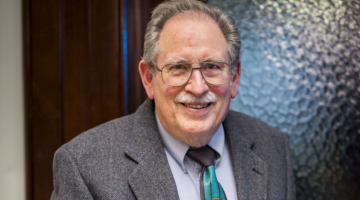 It seems like everyone running for president agrees: Something’s gone terribly wrong with the criminal justice system and it needs to get fixed. The decades of mass incarceration should end. It’s not cost effective and it’s not making our communities safer.
It seems like everyone running for president agrees: Something’s gone terribly wrong with the criminal justice system and it needs to get fixed. The decades of mass incarceration should end. It’s not cost effective and it’s not making our communities safer.
The distinction that the U.S. claims of being the country that incarcerates more people than any other is not one we should be proud of.
So, how do things get changed? Even if the powers that be agree that some of the people now serving sentences should be released, how do we make that happen and under what conditions? Prison has not been a great preparatory school, except for training inmates on how to get back in.

Best Practices In Trust Accounting: What Every Lawyer Needs To Know
Learn legal trust accounting best practices to ensure compliance and protect client funds. Discover expert tips to set your firm up for success.
Here’s how Tim Boland, a guy serving an 11-year sentence for drug trafficking and manslaughter, describes it:
“You put a mouse in a cage for several years and subject it to all sorts of stresses and strip it naked and make it piss in a cup for the sake of security and deprive it of sex and privacy and dignity and then cram a bunch of other mice into the cage that are subjected to the same myriad stresses and deprivations and so forth and then you subject them all to each other. Do that to a mouse and see if it comes out of that cage unmarked by the experience.”
This was one of the pieces read at a recent event sponsored by PEN American Center’s Prison Writing Program. The group solicits works from prison inmates every year and pairs them with mentors. The winners then have their work read by literary well-knowns like Jeffrey Toobin (“The Run of His Life: The People versus O.J. Simpson”) and Piper Kerman (“Orange Is the New Black”). Their work is not published, but that’s not the point. The point is to be heard, to have a reason to feel proud, to learn a skill — writing — and to move on with their lives.
PEN American Center is a subset of PEN International, an organization founded in the early 1900s to promote and defend freedom for writers. According to its website, one of the goals of the PEN American Center is to “celebrate, through writing, our common humanity.”

A Career In Legal Services: Practising Law Institute Honors Toby J. Rothschild
PLI honors Toby J. Rothschild with its inaugural Victor J. Rubino Award for Excellence in Pro Bono Training, recognizing his dedication and impact.
Each piece I heard at the recent annual celebration, whether poem, essay, or short story, did just that. The work captured the unique view of a person on the margins, fighting to maintain his humanity and significance.
The program, working on a shoe-string budget, sends its “Handbook for Writers in Prison” to prisoners who request it. (Some prisoners know of it through word-of-mouth, others were lucky enough to have had a teacher stop by.)
The handbook says it all. Geared toward people who may never have even written a grocery list, it is user friendly, easy to digest, compact, and non-intimidating. It breaks down the mystery of writing into manageable chunks, suggests prompts, and gives examples.
The director of the program, Jackson Taylor, hopes its methodology will be used someday as a rubric, from grammar school to graduate school, for anyone wanting to write better. (He’s uses it himself with graduate students where he teaches at Saint Joseph’s Teachers College, Queens.)
“You start with a fable, something everyone can speak to. Like a snake meeting a fox in the woods,” Taylor said. “What would one say to the other? Everyone can think of some line of dialogue. It develops from there.”
Prisoners work on personal narratives, stories told and re-told in their own families. “Then we look for the moral of the story,” Taylor said. “It’s interesting, everyone can find a moral.”
The program gets approximately1,500 submissions a year and many come back. “They learn a valuable skill. They gain insight to themselves, and some of the work is amazing,” Jackson said.
PEN is also spearheading a partnership with “Hour Children” in Long Island City to help mothers recently released from jail learn the skills necessary to get into college. The first step for some is getting a high school diploma or GED, then they need prepping for the college entrance exams and help filling out the college admission applications. Taylor hopes they’ll be able to partner with local colleges and universities that can assist in the process.
This kind of brick-by-brick work is what will be needed in every state to undo the damage that years of incarceration wreaks on any person. Money saved from the high cost of incarceration must be rechanneled to training, educational, housing, and other transitional services.
Just letting people out of jail is not the answer, it’s only the beginning.
Toni Messina has been practicing criminal defense law since 1990, although during law school she spent one summer as an intern in a large Boston law firm and realized quickly it wasn’t for her. Prior to attending law school, she worked as a journalist from Rome, Italy, reporting stories of international interest for CBS News and NPR. She keeps sane by balancing her law practice with a family of three children, playing in a BossaNova band, and dancing flamenco. She can be reached at [email protected] or tonimessinalaw.com.